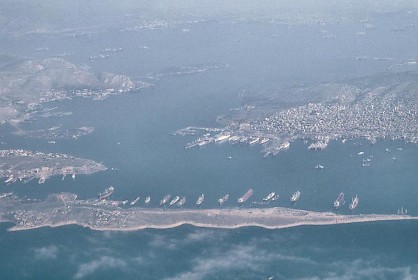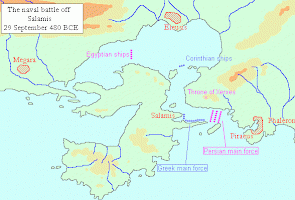Salamis (480 BCE)
Q178850Naval Battle of Salamis (29 September 480): important battle during the Persian War, in which the Greek allies defeated the Persian navy.

After the Persian victories at Artemisium and Thermopylae, king Xerxes proceeded to Athens, which he captured in the last days of September 480. Meanwhile, the Greek navy, which had managed to get away from Artemisium, stayed on the isle of Salamis, opposite Athens. The presence of the enemy close to Phaleron, the Athenian harbor, created a strategic problem for the Persians: they could not use their port as easy as they wanted. And this was something they had to, because their army was proceeding to the Isthmus of Corinth, and it was imperative that the transport ships, brimful with food, could join the soldiers on the Isthmus. It was, therefore, imperative to expel the Greeks from Salamis.

According to a story by Herodotus that may or may not be true, the Athenian admiral Themistocles, pretending to be a friend of the Persians, lured the enemy navy into the straits of Salamis: he ordered a slave to row to the shore, and tell the Persians that the Greek allies were to abandon their position.note If the Persians would enter the strait between Salamis and the mainland, they would easily defeat the Greeks. The story is already known to Aeschylus, a contemporary; on the other hand, the Persians hardly needed this incentive, as they were anyhow forced to attack.
Early in the morning of 29 September, when it was still very dark, the Persians started to enter the narrow strait. Xerxes watched what happened from a nearby hill, and saw how, at dawn, his ships were attacked on their flank. They were almost without a chance. We know that an Egyptian flotilla tried to block the Greek retreat to the north, but it was defeated or neutralized by the Corinthian ships. At nightfall, at least a third of the Persian ships was defeated. Persia had not improved its strategic position and Xerxes recalled his army, which had reached the Isthmus.

The Persians had suffered a serious setback, but it was certainly not a disaster. The Greeks did not pursue the retreating Persian army, which went on to occupy winter quarters in Thessaly. The real decision came in the following year, 479, when the Persian commander Mardonius turned out to have insufficient troops to defeat a united Greek army at Plataea. Things might have been different if the Persian army had received support from its navy: that would have forced to Greeks to divide their attention. The final question remains: why didn't the Persians use the winter of 480/479 to rebuild their navy?